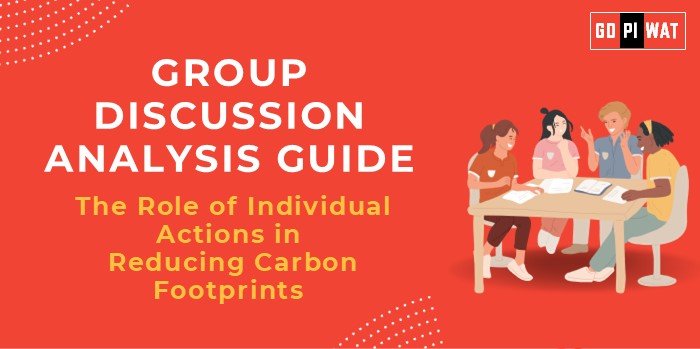🌍 Group Discussion (GD) Analysis Guide
Topic: The Role of Individual Actions in Reducing Carbon Footprints
📚 Introduction to the Topic
Context Setting: Globally, climate change is one of the most pressing challenges, with carbon emissions being a major contributor. Discussions about individual actions—such as adopting renewable energy, reducing waste, and using sustainable products—highlight the critical role each person can play.
Background: Over 34 billion metric tons of CO₂ are emitted annually worldwide, with personal consumption accounting for a significant share. Awareness campaigns like Earth Hour and movements such as “Zero-Waste” emphasize the importance of individual responsibility alongside systemic changes.
📊 Quick Facts and Key Statistics
- Global Emissions: Individuals contribute approximately 72% of global greenhouse gas emissions through lifestyle choices (UN Report, 2023).
- Transportation Impact: Private vehicles account for 45% of global road transportation emissions.
- Dietary Choices: Plant-based diets can reduce carbon footprints by up to 50% compared to meat-heavy diets (Oxford Study, 2022).
- Energy Usage: Switching to energy-efficient appliances reduces household emissions by 25%.
🔑 Stakeholders and Their Roles
- Individuals: Adopt sustainable practices like using public transport and reducing meat consumption.
- Governments: Provide incentives for green energy adoption and regulate emissions from industries.
- Corporations: Develop eco-friendly products and encourage sustainable consumer behavior.
- NGOs/Activists: Educate and inspire communities to adopt green habits.
🌟 Achievements and Challenges
- Achievements:
- Adoption of solar panels in residential areas has doubled in the past decade globally.
- Campaigns like “Plastic-Free July” have significantly reduced single-use plastic consumption in urban areas.
- Cities like Copenhagen incentivize cycling, leading to a 70% reduction in personal vehicle use.
- Challenges:
- Awareness Gap: Many individuals lack knowledge about effective sustainability measures.
- Cost Barriers: High initial costs deter adoption of renewable energy or electric vehicles.
- Systemic Issues: Individual actions alone cannot replace systemic changes like transitioning national energy grids.
📈 Global Comparisons
- Success Example: Sweden’s citizens actively adopt eco-friendly practices, supported by policies like carbon taxes.
- Challenge Example: Developing nations often prioritize economic growth over individual emissions reductions.
⚖️ Structured Arguments for Discussion
- Supporting Stance: “Individual actions drive cultural change, influencing markets and policies toward sustainability.”
- Opposing Stance: “Individual efforts are negligible without structural reforms and corporate responsibility.”
- Balanced Perspective: “While individual actions are crucial, they must complement systemic reforms to achieve climate goals.”
🎯 Effective Discussion Approaches
- Opening Approaches:
- Highlight global emissions data and emphasize the growing role of individual accountability.
- Discuss successful case studies like Sweden or campaigns like Earth Hour.
- Counter-Argument Handling:
- For criticisms of individual efforts’ limited impact, suggest scalable collective actions, such as community solar projects.
💡 Strategic Analysis of Strengths and Weaknesses
- Strengths: Cost savings from energy-efficient practices; growing awareness campaigns.
- Weaknesses: Limited impact without widespread adoption; financial barriers.
- Opportunities: Innovations in personal carbon tracking apps; global movements encouraging participation.
- Threats: Resistance due to economic constraints; misinformation about sustainable practices.
🌱 Connecting with B-School Applications
- Real-World Applications: Topics like carbon accounting can be linked to finance or marketing projects focused on sustainability.
- Sample Interview Questions:
- “How can individuals influence corporations to adopt sustainable practices?”
- “Evaluate the effectiveness of community-driven climate action campaigns.”
- Insights for B-School Students: Learn to quantify environmental impact for business case studies; explore innovative solutions in sustainability-focused entrepreneurship.


